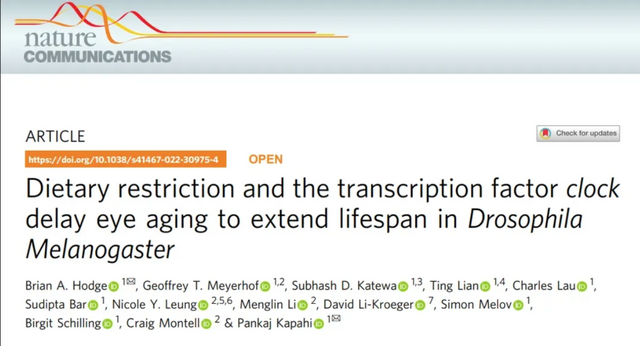In modern society, we are increasingly dependent on electronic devices, especially smartphones and computers, which become an integral part of our daily lives. However, this habit can have profound effects on our health. A recent study published in Nature Communications reveals a fascinating link between diet, eye health and longevity.
The research was carried out by a team led by Professor Pankaj Kapahi from the Buck Institute. They found that restricting the diet not only altered the flies' circadian rhythms, but also extended their lifespan. Although this finding has been verified in fruit flies, the biological mechanism behind it is thought-provoking. Every cell in our body has a rhythm control mechanism that responds to changes in our daily environment, such as light and temperature. These changes not only affect our behavior, but may also affect gene transcription and protein translation processes.
Professor Kapahi's team further found in the new study that the fruit fly's eyes play a key role in this process. In fruit flies on a restricted diet, photoreceptor neurons in their eyes showed rhythmic changes in the expression of many genes, the activation of which regulates life span. This shows that the eyes are not only our window to perceive the outside world, but also an important organ for regulating physiological rhythms.
In addition, studies have shown that reducing light stimulation to the eyes can extend the lifespan of fruit flies. This suggests a sensitivity of the eye and an active immune response. Long-term exposure to light can lead to degradation of photoreceptors and inflammation, which can affect health and longevity. In particular, Professor Kapahi noted that the use of electronic devices at night, especially in light polluted environments, may disrupt our circadian clock, damage vision, and have effects on the brain and the whole body.
This study reminds us that protecting our eyes is not only for eyesight, but also for overall health. The habit of using electronic devices at night may need to be reconsidered. Although the study's conclusions are based on experiments with fruit flies, the implications for us humans are self-evident. While enjoying the convenience brought by technology, we should also be concerned about its potential health risks.
Finally, this study inspires us to further explore the link between eyes and health. The researchers hope to explore whether this link holds true for other organisms and how these findings can be applied to human health and longevity. Finding a balance between technology and nature is something we should all think about. After all that, maybe tonight we should cut down on the amount of time we spend on our devices at night and give ourselves a healthier night.

Authors get paid when people like you upvote their post.
If you enjoyed what you read here, create your account today and start earning FREE STEEM!
If you enjoyed what you read here, create your account today and start earning FREE STEEM!